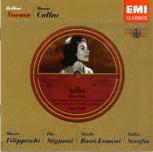This was Maria Callas’ first studio-recorded Norma, and it remains a formidable performance. If it doesn’t quite have the emotional shadings of her 1960 EMI re-make, it is certainly vocally more secure and in its way just as authoritative. The grandeur of the voice itself is always in evidence; her seeming spontaneity to dramatic situations makes the drama real. Mario Filippeschi’s Pollione is impressive–he was a finer tenor than he’s given credit for–and Ebe Stignani’s Adalgisa is warm and blends superbly with Callas in the duets. Nicola Rossi-Lemeni’s Oroveso is a mass of wobbles. Tullio Serafin leads masterfully but observes all the cuts that were standard for the ’50s. Most people prefer the 1960 performance, with its clearer delineation between Norma-the-warrior and Norma-the-woman (and for Corelli and Ludwig in the two supporting roles, not to mention the stereo sound), but by 1960 Callas’ vocal problems were pretty overt, so you’ll have to take the good with the bad. My preference is for the 1955 recording (on Opera d’Oro) with del Monaco under Serafin; its minute-by-minute potency and glorious singing are unmatchable.
































